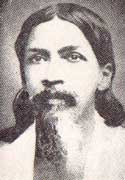|

|
Alphabetical Order
|

|
|
|
 Aurobindo was born in 1872 near Calcutta. He was educated in England from the early age of seven and returned to India in 1893, having passed with distinction the Classical Tripos examinations at Cambridge University. Though he had sat for the Indian Civil Service examination and passed it, he failed to turn up for the compulsory horse riding test. Even as a student at Cambridge, his thoughts had turned to India and the struggle for independence.
Aurobindo was born in 1872 near Calcutta. He was educated in England from the early age of seven and returned to India in 1893, having passed with distinction the Classical Tripos examinations at Cambridge University. Though he had sat for the Indian Civil Service examination and passed it, he failed to turn up for the compulsory horse riding test. Even as a student at Cambridge, his thoughts had turned to India and the struggle for independence.
The years from 1892 onwards were years of much study and inward searching for Sri Aurobindo. He earned his living by working in the Baroda state service, initially in the revenue department and later as a teacher of English. They were years of preparation. He read voraciously. He learnt his mother tongue, Bengali, for the first time. He mastered Sanskrit so that he may read the Upanishads in the original.
Sri Aurobindo came to be increasingly involved in the freedom struggle. These were the years of the heavy handed approach of Lord Curzon who served as the Viceroy of British India. The Indian National Congress itself failed to provide effective leadership. It was torn between the so called 'moderates' who sought to persevere in the path of reformism, of discussion and dialogue, of pleading and persuasion and the 'militants' to whom these were methods which merely perpetuated British rule.
And nowhere was the militancy greater than in Bengal which had a strong literary and university tradition. Aurobindo maintained contacts with many of the militants and his brother Barinda was engaged directly in revolutionary work. In 1903, at the instance of his brother, he wrote the pamphlet 'Bhavani Mandir'. It was meant to train people for revolutionary struggle.
The British response to the rising militancy of the educated Hindus of Bengal was predictable. On the one hand they used the strong arm of the law but they attempted to avoid action which may lead to the birth of martyrs. They refrained from using the British army because that would easily lead to a confrontation between "them" and "us". They preferred to use the Police which was manned mainly by Indians themselves.
|




 Aurobindo was born in 1872 near Calcutta. He was educated in England from the early age of seven and returned to India in 1893, having passed with distinction the Classical Tripos examinations at Cambridge University. Though he had sat for the Indian Civil Service examination and passed it, he failed to turn up for the compulsory horse riding test. Even as a student at Cambridge, his thoughts had turned to India and the struggle for independence.
Aurobindo was born in 1872 near Calcutta. He was educated in England from the early age of seven and returned to India in 1893, having passed with distinction the Classical Tripos examinations at Cambridge University. Though he had sat for the Indian Civil Service examination and passed it, he failed to turn up for the compulsory horse riding test. Even as a student at Cambridge, his thoughts had turned to India and the struggle for independence.